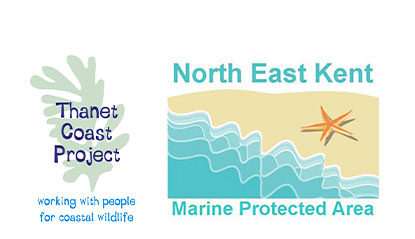General Researcher Seashore Code
Respect coastal wildlife
- Try to leave everything as you find it.
- Always carefully replace stones or seaweed when collecting.
- Tread carefully and avoid disturbing wildlife on the shore. Use coastal footpaths where present.
- Take care to avoid fast or erratic movements or noise that may put feeding or roosting coastal birds to flight – especially between 1st October and 31st March and at high tide or at night.
- Stay clear of the main bird roosts, and summer breeding grounds (1st April to 31st July). Turnstone wintering roost maps are available from Thanet Coast Project. For information on other bird roosts/breeding areas, contact English Nature in advance of starting your work.
Consider our coastline and other users
- Take your rubbish home and report hazards.
- Try to avoid damaging the cliffs or chalk rocks especially on the lower shore, where it is fragile.
- Back-fill any holes that you dig to restore the seashore and make it safe for other users.
- Take care to avoid disturbance to archaeological sites on the beach – notably at St
- Mildred’s and Minnis Bays.
- Don’t block public access
- Respect the rights of all other users.
- Monitoring equipment needs to be adequately marked – especially at night, and should not cause an obstruction or hazard. Relevant authorities should be informed of its location.
Stay safe
- Check tide times to avoid being cut off and let someone know where you are going.
- Check bay signs for activity zones, bylaws and local beach safety information. Keep away from areas that may cause a danger with other priority users, such as at designated launch sites or within moorings.
- Be aware of local hazards and conditions.
- Wear clothing suitable for the weather or coastal conditions – such as windproofs, waterproofs, wellies, or sun creams.
Take care
- near cliffs and don’t throw anything over the edge.
- walking on slippery rocks, slopes or near the edge of promenades.
- walking on soft sand and mud.
Be scientifically responsible
- Register your research with the North East Kent Coastal Scientific Advisory Group. When your work is complete, please provide details of the finished report and where it can be located.
- You may need the landowner’s permission – contact the local authority to establish land ownership – and always request permission when extracting or removing items.
- Limit your collecting to the minimum you need for your work.
- Follow your specific professional or association guidelines.

